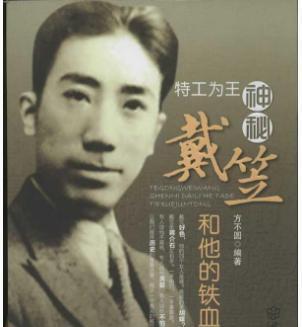Dai Kasa (28 May 1897 – 17 March 1946) was a lieutenant general in the Chinese National Revolutionary Army and head of the Bureau of Survey and Statistics of the Military Commission of the Nationalist Government. Because of his uncertain and mysterious movements, he was called a mysterious figure in Asia by the American "Colliers" magazine and the most mysterious person in China's modern history.

A native of Baoan Township, Jiangshan County, Quzhou Prefecture (present-day Jiangshan City, Quzhou City), Zhejiang Province, graduated from the sixth phase of the Huangpu Military Academy, and served as a soldier in the Zhou Fengqi Department of the Zhejiang Army in his early years, he left the army and went to Shanghai to meet Chiang Kai-shek, Dai Jitao and others on the Shanghai Stock Exchange.
Trusted by Chiang Kai-shek, Dai Kasa has long been engaged in secret agent and espionage work, and was responsible for the Military Command Bureau of the Intelligence And Governance Organ of the Nationalist Government of the Republic of China, and served as deputy director (but actual leader) and director of the Sino-US Special Technical Cooperation Institute. The operation of the Military Command Bureau under his leadership killed and persecuted many dissidents, members of the Ccp and democratic parties, the Japanese and traitors who cooperated with the Japanese, and even Chiang Kai-shek's political enemies within the Chinese Kuomintang.
It is undeniable that in the War of Resistance Against Japan, Dai Kasa and the Military Command Bureau led by him made outstanding contributions to the Republic of China and also made great contributions to the War of Resistance Against Japan. After the end of the War of Resistance Against Japan, Dai Kasa died in a plane crash in 1946 and was posthumously promoted to lieutenant general by the Nationalist government.
In 1938, in order to check and balance the central unification, Chiang Kai-shek renamed the investigation office under Dai Kasa as the "Investigation and Statistics Bureau of the Military Commission", which was subordinate to the Military Commission, referred to as "Military Unification". As a result, a secret service organization that resounded throughout China's modern history stepped onto the stage of history.
In the personnel arrangements of the military command, Chiang Kai-shek remembered the pressure he had faced from all sides before forcibly appointing Dai Kasa as the chief of the secret service. The appointment of an informal sector has caused a stir, let alone the post of director. After consideration, Chiang Kai-shek decided to appoint He Yaozu, the first director of the attendant room, as the director of the bureau, and put Dai Kasa in the position of deputy director.
Since then, the directors of the Military Command have all served as the director of the first department of the Attendant Office, and several of them have served as the director of the Military Command Bureau. However, these top leaders were well aware of Chiang Kai-shek's intentions, never asked about the activities and personnel of the military command, and all the work was handled by Dai Kasa and directly responsible to Chiang Kai-shek. It is precisely because of this that the title of Dai Kasa within the military command has undergone a subtle change, and when subordinates mention the deputy director, they are called "boss".
There is an unwritten rule in the military command that successive bureau chiefs only come to listen to Dai Kasa's annual report on April 1 of each year, and simply go through the formalities. In the eyes of the Kuomintang military and political leaders, Dai Kasa was actually the "leader" of the military command and the "soul figure" of the military command.
In 1940, Dai Kasa was formally straightened out and became the director of the military command. As a result, Dai Kasa held great power and officially began his career as the head of the military command.